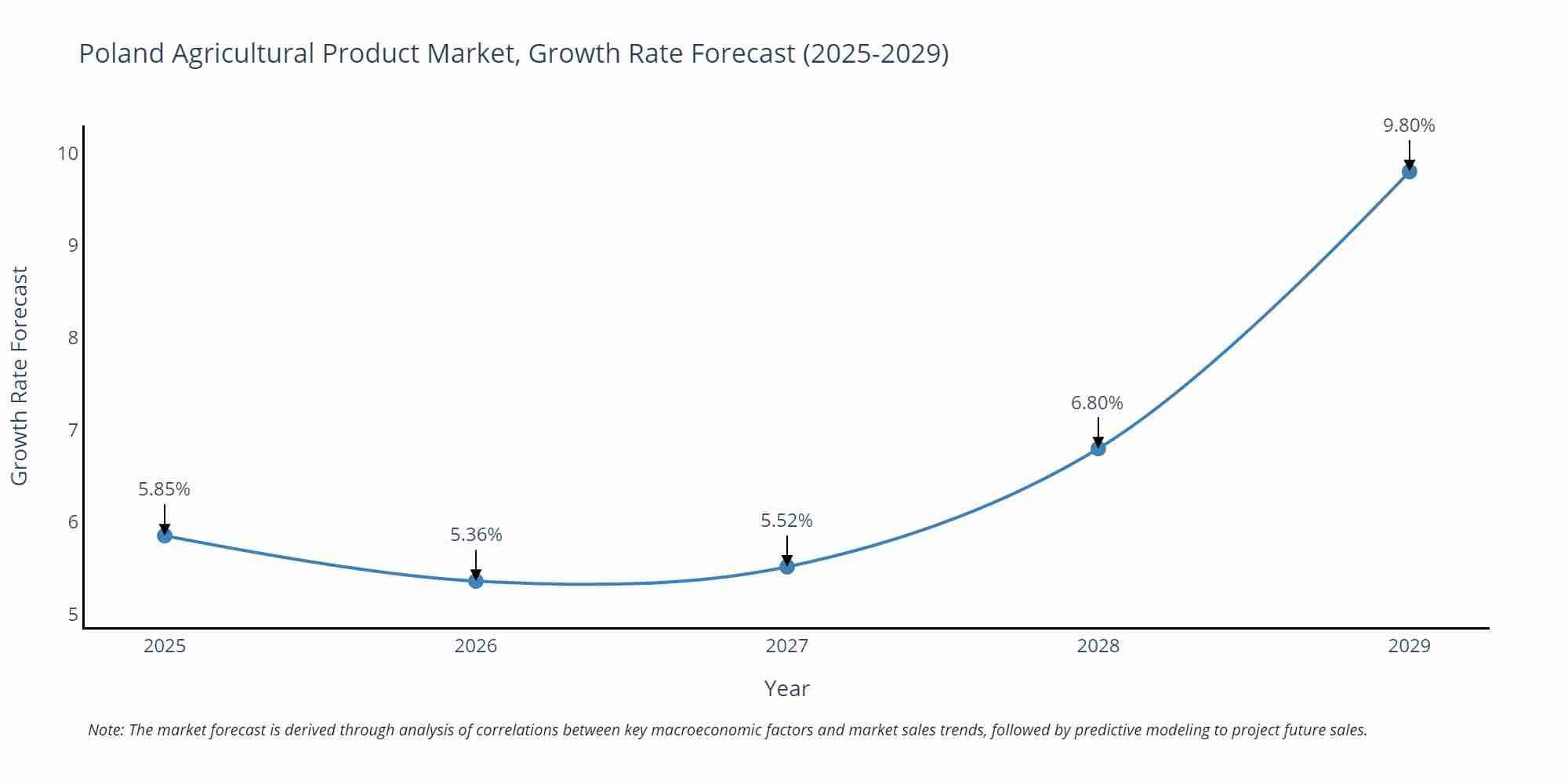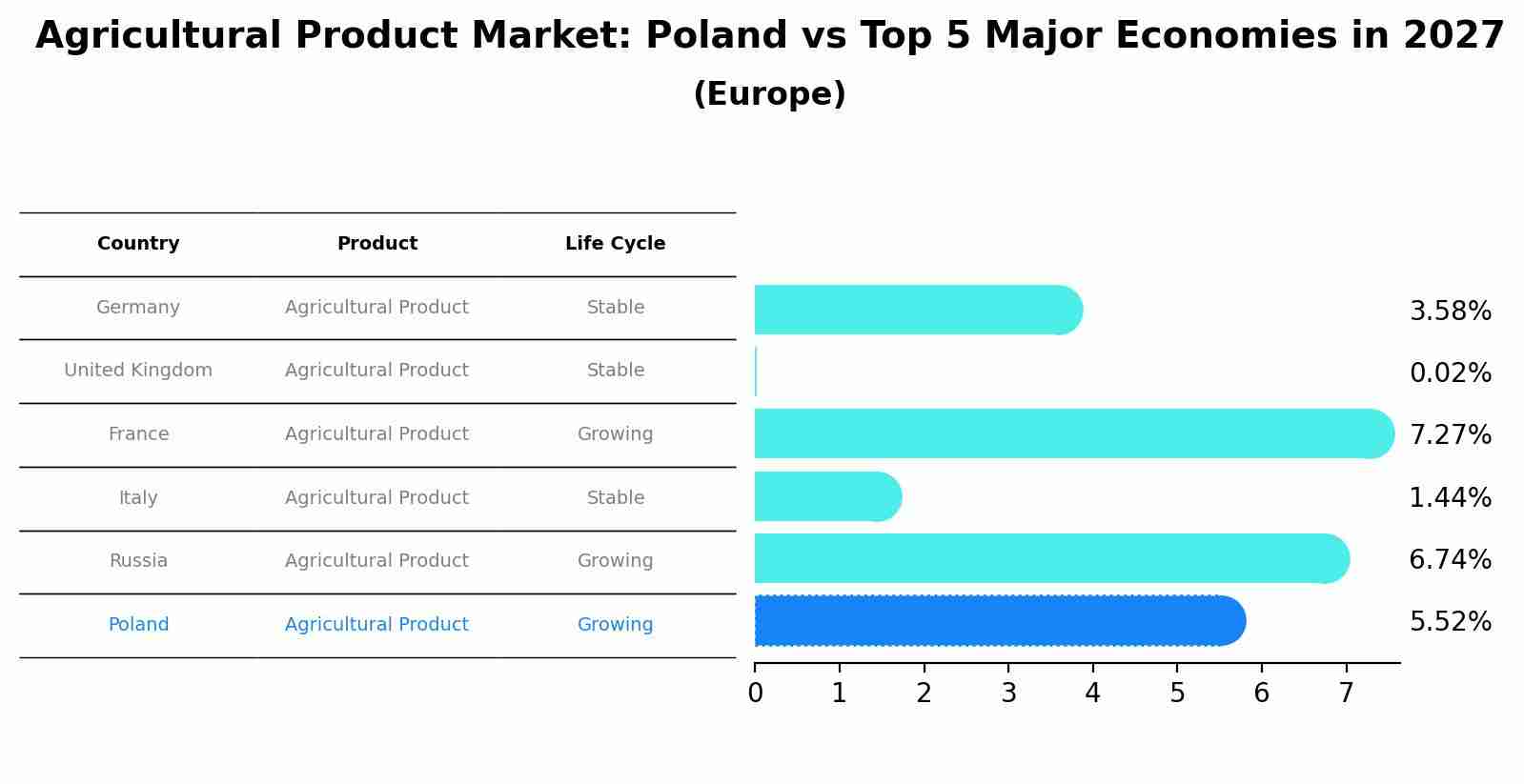Poland Agricultural Product Market Outlook | Value, Share, COVID-19 IMPACT, Growth, Companies, Industry, Revenue, Analysis, Trends, Size & Forecast
| Product Code: ETC379635 | Publication Date: Aug 2022 | Updated Date: Jul 2025 | Product Type: Market Research Report | |
| Publisher: 6Wresearch | Author: Shubham Deep | No. of Pages: 75 | No. of Figures: 35 | No. of Tables: 20 |
Poland Agricultural Product Market Size Growth Rate
The Poland Agricultural Product Market is projected to witness mixed growth rate patterns during 2025 to 2029. Commencing at 5.85% in 2025, growth builds up to 9.80% by 2029.

Agricultural Product Market: Poland vs Top 5 Major Economies in 2027 (Europe)
The Agricultural Product market in Poland is projected to grow at a growing growth rate of 5.52% by 2027, within the Europe region led by Germany, along with other countries like United Kingdom, France, Italy and Russia, collectively shaping a dynamic and evolving market environment driven by innovation and increasing adoption of emerging technologies.

Poland Agricultural Product Market Synopsis
The Poland agricultural product market is diverse and robust, with a strong focus on crops such as wheat, potatoes, and sugar beets. Livestock farming also plays a significant role, particularly in the production of pork, poultry, and dairy products. The market is characterized by a mix of traditional small-scale farms and larger commercial operations, with a growing emphasis on sustainable and organic farming practices. Poland is a leading producer of apples in Europe and has a well-established food processing industry. The country benefits from fertile soil, favorable climate conditions, and government support for the agricultural sector. Market trends include increasing demand for organic products, technological advancements in farming practices, and a focus on export opportunities to international markets.
Poland Agricultural Product Market Trends
In the Poland Agricultural Product Market, some current trends include a growing demand for organic and sustainable farming practices driven by consumer preferences for healthier and environmentally-friendly products. There is also an increasing focus on technological advancements in agriculture, such as precision farming techniques and the use of data analytics for improved productivity and efficiency. Additionally, the market is seeing a shift towards more diversified and specialized crop production to cater to niche markets and increase profitability for farmers. Government support for modernizing the agricultural sector and promoting rural development is also influencing the market landscape. Overall, these trends indicate a move towards a more sustainable, efficient, and diverse agricultural sector in Poland.
Poland Agricultural Product Market Challenges
In the Poland agricultural product market, some challenges include increasing competition from imported products, fluctuating weather conditions affecting crop yields, and rising production costs. The market is also impacted by changing consumer preferences towards organic or locally sourced products, requiring farmers to adapt and invest in new farming techniques. Additionally, there are concerns about sustainability and environmental impact, leading to pressure for more eco-friendly practices in agriculture. Furthermore, policy changes and regulations within the European Union can have a significant impact on the market dynamics in Poland, requiring farmers and producers to stay informed and compliant. Overall, navigating these challenges requires a strategic approach and continuous innovation within the agricultural sector in Poland.
Poland Agricultural Product Market Investment Opportunities
Investment opportunities in the Poland Agricultural Product Market include the potential for growth in organic farming due to the increasing demand for organic products both domestically and internationally. Additionally, there is room for investment in technology and innovation within the agricultural sector to improve efficiency and sustainability. With Poland being a leading producer of apples, investments in modern storage and distribution facilities can enhance the export capabilities of the country. Furthermore, there is a growing trend towards agri-tourism in Poland, presenting opportunities for investors to develop sustainable and experiential agricultural tourism ventures. Overall, the Poland Agricultural Product Market offers diverse investment opportunities ranging from traditional farming practices to innovative technologies and value-added products.
Jordan Agar Market Government Policies
In Poland, the government has implemented various policies to support the agricultural product market. The Common Agricultural Policy (CAP) of the European Union provides subsidies and financial support to Polish farmers to ensure food security and sustainable agriculture practices. Additionally, the government has implemented measures to promote organic farming and environmentally-friendly practices within the sector. There are also regulations in place to ensure food safety and quality standards are met, both for domestic consumption and export purposes. Furthermore, programs are in place to support rural development, improve infrastructure, and enhance competitiveness in the agricultural sector. Overall, the government policies in Poland aim to support and develop the agricultural product market while ensuring sustainability and quality standards are maintained.
Poland Agricultural Product Market Future Outlook
The future outlook for the Poland Agricultural Product Market appears positive with several key trends driving growth. Increasing consumer awareness and preference for organic and locally sourced food products are expected to boost demand for domestic agricultural products. Furthermore, advancements in technology and precision farming techniques are likely to improve productivity and efficiency in the sector. The government`s focus on supporting sustainable agriculture practices and rural development initiatives will also play a significant role in shaping the market landscape. Overall, the Poland Agricultural Product Market is poised for steady growth in the coming years, driven by a combination of shifting consumer preferences, technological advancements, and government support.
Key Highlights of the Report:
- Poland Agricultural Product Market Outlook
- Market Size of Poland Agricultural Product Market, 2021
- Forecast of Poland Agricultural Product Market, 2031
- Historical Data and Forecast of Poland Agricultural Product Revenues & Volume for the Period 2018 - 2031
- Poland Agricultural Product Market Trend Evolution
- Poland Agricultural Product Market Drivers and Challenges
- Poland Agricultural Product Price Trends
- Poland Agricultural Product Porter's Five Forces
- Poland Agricultural Product Industry Life Cycle
- Historical Data and Forecast of Poland Agricultural Product Market Revenues & Volume By Type for the Period 2018 - 2031
- Historical Data and Forecast of Poland Agricultural Product Market Revenues & Volume By Food for the Period 2018 - 2031
- Historical Data and Forecast of Poland Agricultural Product Market Revenues & Volume By Fiber for the Period 2018 - 2031
- Historical Data and Forecast of Poland Agricultural Product Market Revenues & Volume By Fuel for the Period 2018 - 2031
- Historical Data and Forecast of Poland Agricultural Product Market Revenues & Volume By Raw Material for the Period 2018 - 2031
- Historical Data and Forecast of Poland Agricultural Product Market Revenues & Volume By Application for the Period 2018 - 2031
- Historical Data and Forecast of Poland Agricultural Product Market Revenues & Volume By Direct Consumption for the Period 2018 - 2031
- Historical Data and Forecast of Poland Agricultural Product Market Revenues & Volume By Food & Fabrics for the Period 2018 - 2031
- Historical Data and Forecast of Poland Agricultural Product Market Revenues & Volume By Construction & Paper Products for the Period 2018 - 2031
- Historical Data and Forecast of Poland Agricultural Product Market Revenues & Volume By Others for the Period 2018 - 2031
- Historical Data and Forecast of Poland Agricultural Product Market Revenues & Volume By Industry Vertical for the Period 2018 - 2031
- Historical Data and Forecast of Poland Agricultural Product Market Revenues & Volume By Food & Nutrition for the Period 2018 - 2031
- Historical Data and Forecast of Poland Agricultural Product Market Revenues & Volume By Sustainable Agribusiness for the Period 2018 - 2031
- Historical Data and Forecast of Poland Agricultural Product Market Revenues & Volume By Production & Harvesting for the Period 2018 - 2031
- Historical Data and Forecast of Poland Agricultural Product Market Revenues & Volume By Agribusiness Technological Inputs for the Period 2018 - 2031
- Historical Data and Forecast of Poland Agricultural Product Market Revenues & Volume By Others for the Period 2018 - 2031
- Poland Agricultural Product Import Export Trade Statistics
- Market Opportunity Assessment By Type
- Market Opportunity Assessment By Application
- Market Opportunity Assessment By Industry Vertical
- Poland Agricultural Product Top Companies Market Share
- Poland Agricultural Product Competitive Benchmarking By Technical and Operational Parameters
- Poland Agricultural Product Company Profiles
- Poland Agricultural Product Key Strategic Recommendations
Frequently Asked Questions About the Market Study (FAQs):
- Single User License$ 1,995
- Department License$ 2,400
- Site License$ 3,120
- Global License$ 3,795
Search
Thought Leadership and Analyst Meet
Our Clients
Related Reports
- Afghanistan Apparel Market (2026-2032) | Growth, Outlook, Industry, Segmentation, Forecast, Size, Companies, Trends, Value, Share, Analysis & Revenue
- Canada Oil and Gas Market (2026-2032) | Share, Segmentation, Value, Industry, Trends, Forecast, Analysis, Size & Revenue, Growth, Competitive Landscape, Outlook, Companies
- Germany Breakfast Food Market (2026-2032) | Industry, Share, Growth, Size, Companies, Value, Analysis, Revenue, Trends, Forecast & Outlook
- Australia Briquette Market (2025-2031) | Growth, Size, Revenue, Forecast, Analysis, Trends, Value, Share, Industry & Companies
- Vietnam System Integrator Market (2025-2031) | Size, Companies, Analysis, Industry, Value, Forecast, Growth, Trends, Revenue & Share
- ASEAN and Thailand Brain Health Supplements Market (2025-2031) | Strategy, Consumer Insights, Analysis, Investment Trends, Opportunities, Growth, Size, Share, Industry, Revenue, Segments, Value, Segmentation, Supply, Forecast, Restraints, Outlook, Competition, Drivers, Trends, Demand, Pricing Analysis, Competitive, Strategic Insights, Companies, Challenges
- ASEAN Bearings Market (2025-2031) | Strategy, Consumer Insights, Analysis, Investment Trends, Opportunities, Growth, Size, Share, Industry, Revenue, Segments, Value, Segmentation, Supply, Forecast, Restraints, Outlook, Competition, Drivers, Trends, Demand, Pricing Analysis, Competitive, Strategic Insights, Companies, Challenges
- Europe Flooring Market (2025-2031) | Outlook, Share, Industry, Trends, Forecast, Companies, Revenue, Size, Analysis, Growth & Value
- Saudi Arabia Manlift Market (2025-2031) | Outlook, Size, Growth, Trends, Companies, Industry, Revenue, Value, Share, Forecast & Analysis
- Uganda Excavator, Crane, and Wheel Loaders Market (2025-2031) | Strategy, Consumer Insights, Analysis, Investment Trends, Opportunities, Growth, Size, Share, Industry, Revenue, Segments, Value, Segmentation, Supply, Forecast, Restraints, Outlook, Competition, Drivers, Trends, Demand, Pricing Analysis, Competitive, Strategic Insights, Companies, Challenges
Industry Events and Analyst Meet
Whitepaper
- Middle East & Africa Commercial Security Market Click here to view more.
- Middle East & Africa Fire Safety Systems & Equipment Market Click here to view more.
- GCC Drone Market Click here to view more.
- Middle East Lighting Fixture Market Click here to view more.
- GCC Physical & Perimeter Security Market Click here to view more.
6WResearch In News
- Doha a strategic location for EV manufacturing hub: IPA Qatar
- Demand for luxury TVs surging in the GCC, says Samsung
- Empowering Growth: The Thriving Journey of Bangladesh’s Cable Industry
- Demand for luxury TVs surging in the GCC, says Samsung
- Video call with a traditional healer? Once unthinkable, it’s now common in South Africa
- Intelligent Buildings To Smooth GCC’s Path To Net Zero


















